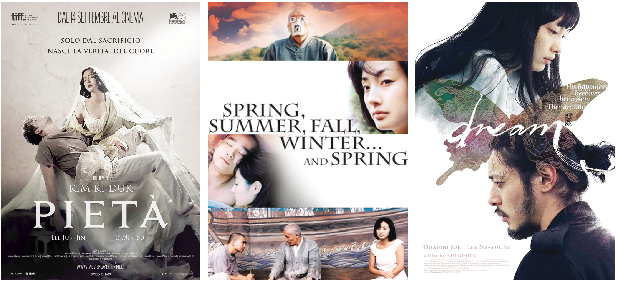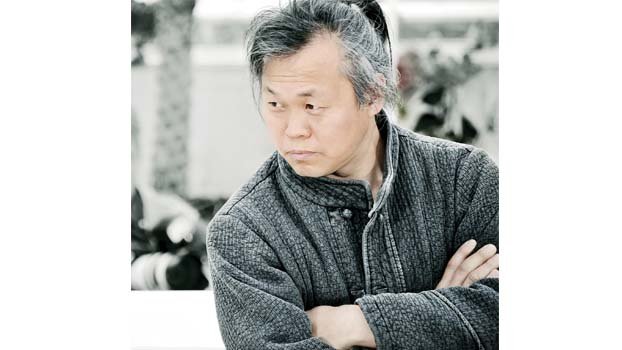Director’s Directory
Kim Ki-duk: Director of controversy

Kim Ki-duk is a South Korean filmmaker whose films and personal life have been mired with controversy. He is a self-taught director who prides himself on his outsider status, openly setting himself apart from contemporaries like Hong Sang-soo and Lee Chang-dong, who he considers too intellectual. Kim’s movies have been criticized greatly for their subject matter and praised for their technique. His films are set apart due to their brutal and eccentric nature.
Born in a mountainous village, Kim moved with his family to Seoul at the age of nine. During his teenage years he dropped out of school and worked in factories, and at the age of 20, he began a five-year stint in the marines, the toughest and most demanding branch of the Korean military. These early experiences would inspire the gritty milieu and dim view of human relationships that characterize his films.
A painter since childhood, Kim went to France in 1990, where he studied art and scraped together a meager living by selling his paintings on the streets. Kim returned to Korea in 1993 and began writing screenplays. Despite his lack of formal education, he achieved early success in screenplay competitions and soon moved into directing. His first two films, Crocodile (1996) and Wild Animals (1997), were violent, angry portrayals of alienated young people.
His third film, Birdcage Inn (1998), introduced one of his recurring themes -- prostitution -- which, in Kim's profoundly disenchanted world view, seems to represent the normal state of affairs between men and women. While that film brought more lyrical elements to his style, it was 1999's The Isle that was his real breakthrough. Balancing pictorial beauty with at times stomach-turning imagery, it tells the story of a mute prostitute servicing fishermen at a lake resort. It brought him attention at international film festivals and was his first film to be distributed in the United States.

He followed it with Real Fiction (2000), a not entirely successful experiment shot in 200 minutes on the streets of Seoul using ten film and two video cameras that follows a young man trying to track down and kill everyone who's done him wrong.
Set in and around a United States army base, his 2001 feature Address Unknown examines the troubling legacy of the Korean War. Kim's next film, 2001's Bad Guy (which earned him the sobriquet "the bad guy of Korean cinema"), was his most popular and controversial, partly owing to the fact that its star, Jo Jae-hyeon, who worked on five of Kim's previous films, had become a television celebrity by the time of its release. The story of a mute thug who kidnaps an innocent college girl and forces her into prostitution, Bad Guy was widely reviled as misogynistic, and is all the more troubling for the intensity of its images.
Kim drew on his experiences in the marines for The Coast Guard (2002), in which a young recruit suffers moral anguish following an accidental shooting. His 2003 feature Spring, Summer, Fall, Winter...And Spring was, for many, a surprising turning point in Kim's artistic output. Set in a stunning landscape, it portrays the lives of two Buddhist monks and the lost souls who come to them for solace. A much more mature film than his previous efforts, it nonetheless focuses on the essential brutality of human nature. It marks a new phase in the career of a brash, undeniably talented filmmaker.
In 2004, he received Best Director awards at two different film festivals, for two different films. At the Berlin International Film Festival, he was awarded for Samaritan Girl (2004), and at the Venice Film Festival he won for 3-Iron (also 2004). In 2011, his documentary film Arirang received an award for best film in the Un Certain Regard category from the Cannes Film Festival. In 2012, his film Pieta received the Golden Lion award at the Venice Film Festival, the first Korean film to receive a "best film" honor at one of the top three international film festivals - Venice, Berlin and Cannes.
The British Board of Film Classification delayed the release of Kim Ki-duk's The Isle (2000) in the United Kingdom because of instances of animal cruelty in the film. Concerning scenes in which a frog is skinned after being beaten to death and fish are mutilated, the director stated, "We cooked all the fish we used in the film and ate them, expressing our appreciation. I've done a lot of cruelty on animals in my films. And I will have a guilty conscience for the rest of my life."
Another controversy surrounds the director’s alleged misogyny, represented in his films supposedly, decried by feminists in his home country.
In 2017, an anonymous actress came forward with allegations that she had been assaulted by Kim on the set of his film Moebius. She claimed that he had hit her several times before pressuring her to participate in a sex scene she had not previously agreed to. In 2018, at least three women accused Kim of sexual assault. Kim filed false accusations and defamation suits against the accusers.
Despite the controversy surrounding his career and personal life, Kim is considered one of South Korea’s most iconic and talented directors. His films depict brutal realities and delve deep into the human psyche. His films are able to portray his profoundly disenchanted world view. While some of the imagery in his films are hard to stomach, they also portray beauty in a heart wrenching manner.



